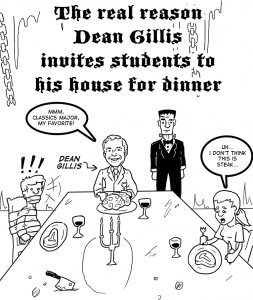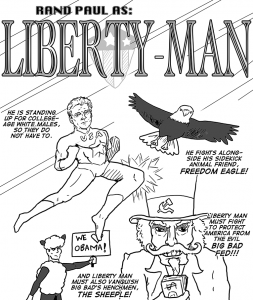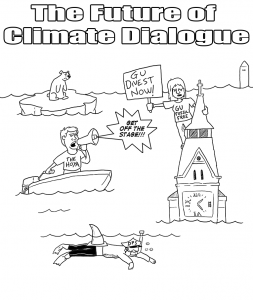Sometimes college feels like an adult romper room. With graduation nearing, all three of my classes have turned to reading and commenting on peers’ final papers, and I’ve found that the unspoken classroom rules mirror those of day care, particularly the command to always play nice. I like the idea of peer review, and it’s even a gratifying send-off to undergraduatism—it’s premised on both our writing and our feedback having achieved a level of sophistication that makes them worthy of wider consideration. But when we reach the classroom, few can find the point between ‘don’t hit’ and ‘be respectful’ that lets them speak freely about the flaws of a classmate’s work, and I’ve yet to read or write a piece without flaws.
It would be much more helpful for all of us if our papers left those classrooms in shards. Instead, it seems like the barrier to raising your hand is having some point of praise to help the criticism go down easier. At twenty-one, I’d rather leave this Mary Poppins treatment behind; in a writing class for upperclassmen, criticism is neither rude nor unnecessary. Even good writers sweat out bad pieces, and I hope they’d like to know it when they do. The decision we make everyday in those classrooms is to value politeness over honesty, and it leaves us victims as much as perpetrators.
I don’t want to rail against these workshop classes too harshly, because they’re just a symptom. The disease, as expressed by a University of Virginia newspaper editor in a March 2 Washington Post column by Marc Fisher, is that people “don’t expect that something that’s published should be true.” A ghastly prospect for newspapers, it reflects a broader trend—we don’t much expect honesty in many of our everyday interactions. Pleasantry more often is the rule, and I don’t just mean in response to cliché set-ups like “do I look fat in this?” The routinely inoffensive has come to regularly obscure useful, honest information underneath.
The measure of the problem is the depth of the honesty people do employ when sheltered by anonymity. Take the blog “University Diaries,” the internet haven of a George Washington professor who occasionally selects a college newspaper article and excoriates its writing in the way my classmates and I probably should in those workshops. A Hoya op-ed was recently obliterated there, but more interesting to me were the comments underneath. A regular reader asked the professor if she would ever do this to a student’s acadmic paper, to which she replied, “Never.” Even if newspaper articles are what she calls “fair game”—and as published pieces, they are—that she is less honest in criticizing her own students is tragic.
There’s more at stake than writing, despite the narrow focus of my examples. Our nonchalance toward honesty is visible right down to how readily we lie about insignificant things, like the reasons we miss class—seniors this year have had more job interviews than there are employers. I imagine the same true-feeling cover-up going on in the Bush White House in 2002, as some character like Dick Cheney says, “We should invade Iraq,” while Colin Powell and Dick Armitage shoot each other looks that say ‘ohmygawd.’ Then Powell speaks up, saying, “That sounds like a great idea, Dick, and it works pretty well, but I think maybe you should think about what you’re going to do after you invade.” Cheney mutters, “Hmm, yeah, that’s a good idea,” jots something down, and the next day the U.S. bombs Baghdad. Current U.S. death toll: over 4000.
I’ve lately been reminded of a poster my mom hung in my room when I was a little kid, titled “All the Things I Really Need to Know I Learned in Kindergarten.” It was dentist-waiting-room fodder for sure, full of lessons like ‘clean up your own mess’ and ‘we all die,’ and by the end of college it’s time we realized that some of those little lessons are mutually exclusive. You can’t be nice all the time and always tell the truth, and usually we defer toward the easy and sacrifice the honest. In those sixteen years since kindergarten, it’s become clear that the honest reply is both more helpful, and more decent, than the insincerely kind one.
Let’s not forget that even with all those rules, kindergarten confrontations often ended up with somebody hitting someone else anyway. Maybe sometimes that was better, and maybe sometimes it could have been avoided if overwhelming niceness weren’t the only permitted alternative. Either way, it was, and still is, part of growing up.





